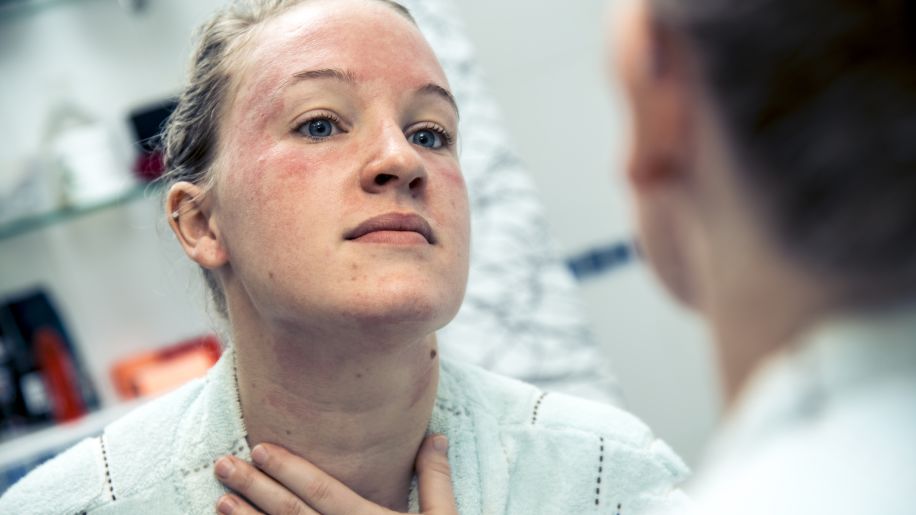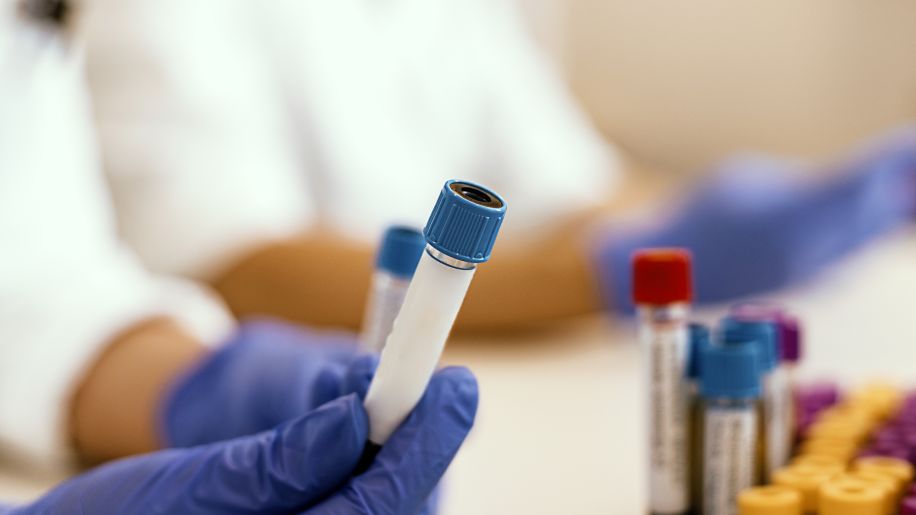7 answers about angioedema
Learn about this type of inflammation beneath the skin that often occurs alongside hives.

Angioedema
Urticaria, commonly known as hives, is a rash of red, inflamed, itchy welts that occur on the surface of the skin. Angioedema is sometimes described as hives that occur beneath the skin. Up to half of people who experience hives also experience angioedema.
Here, we look at answers to some common question about angioedema.

Symptoms
What are the symptoms of angioedema?
Areas of the body that are commonly affected by angioedema include the eyelids, lips, ears, cheeks, the backs of the hands and feet, and the genitals. The affected areas of the body appear puffy and swollen. Affected areas can feel uncomfortable and full, and… Show More
What are the symptoms of angioedema?
Areas of the body that are commonly affected by angioedema include the eyelids, lips, ears, cheeks, the backs of the hands and feet, and the genitals. The affected areas of the body appear puffy and swollen. Affected areas can feel uncomfortable and full, and sometimes hot or painful. Symptoms will typically be more severe on one side of the body. The skin may appear red, but not always, and as mentioned above, angioedema often occurs alongside hives.
Angioedema can also affect the digestive tract, which can cause a variety of gastrointestinal symptoms such as nausea, vomiting, diarrhea, and abdominal pain. It can also cause swelling in the inside of the mouth, including the tongue, and the lining of the mouth, throat, and airways.
In some cases, angioedema can be a sign of a serious reaction that requires emergency medical treatment, which is discussed on a later slide.
Show Less
Angioedema Without Hives
Can angioedema occur without hives?
While angioedema is frequently associated with hives, it can occur without hives. There are people who will sometimes experience hives, sometimes experience angioedema without hives, and sometimes experience both. There are other people who only experience… Show More
Can angioedema occur without hives?
While angioedema is frequently associated with hives, it can occur without hives. There are people who will sometimes experience hives, sometimes experience angioedema without hives, and sometimes experience both. There are other people who only experience angioedema, but do not experience hives. Angioedema without hives is associated with a number of hereditary and non-hereditary disorders. Symptoms and patterns of symptoms are important to discuss with a healthcare provider, as they can help determine what is causing angioedema, which can help determine an appropriate approach to treating it.

Causes
What causes angioedema?
Like hives, angioedema is an inflammatory immune response caused by a release of inflammatory chemicals. These chemicals cause very small blood vessels called capillaries to become damaged and leak fluid. Angioedema has many different triggers, and anything that can trigger… Show More
What causes angioedema?
Like hives, angioedema is an inflammatory immune response caused by a release of inflammatory chemicals. These chemicals cause very small blood vessels called capillaries to become damaged and leak fluid. Angioedema has many different triggers, and anything that can trigger hives can also trigger angioedema. Common triggers include:
- Allergic reactions to insect bites, foods, and airborne allergens.
- Reactions to medications, including aspirin and other NSAIDs, and medications given for cardiovascular disease and blood pressure.
- Physical or environmental triggers, such as cold temperatures, physical exertion, and pressure or vibration against the skin.
- Injuries and infections.
- Mental and emotional stress.
There is also hereditary and acquired angioedema, which are caused by a deficiency or malfunction of a protein called C1 inhibitor.
Show Less
Hereditary and Acquired
What are hereditary and acquired angioedema?
The immune system depends on many different proteins to function correctly. One of these proteins is C1 inhibitor, which is found in the blood and helps prevent immune proteins from damaging healthy cells. When a person does not have enough C1 inhibitor,… Show More
What are hereditary and acquired angioedema?
The immune system depends on many different proteins to function correctly. One of these proteins is C1 inhibitor, which is found in the blood and helps prevent immune proteins from damaging healthy cells. When a person does not have enough C1 inhibitor, or has C1 inhibitor that does not function correctly, angioedema can occur. In some cases, this deficiency or malfunction is the result of a genetic disorder (hereditary angioedema). In other cases, this is the result of another illness that impacts the functioning of the immune system, such as lymphomas and autoimmune disorders (acquired angioedema). There are blood tests to determine the amount of C1 inhibitor in the blood and if C1 inhibitor is functioning normally.

Chronic Urticaria
What is chronic urticaria?
Up to 40 percent of people who have chronic hives (chronic urticaria) experience angioedema. Hives are categorized as chronic when they last for longer than six weeks. They are further categorized as inducible and spontaneous. Chronic inducible urticaria refers to hives… Show More
What is chronic urticaria?
Up to 40 percent of people who have chronic hives (chronic urticaria) experience angioedema. Hives are categorized as chronic when they last for longer than six weeks. They are further categorized as inducible and spontaneous. Chronic inducible urticaria refers to hives and/or angioedema that can be induced by physical factors such as cold temperatures, physical exertion, and pressure or vibration against the skin. Chronic spontaneous urticaria refers to hives and/or angioedema that have no identifiable cause or trigger (and is also sometimes called chronic idiopathic urticaria). Most cases of chronic hives are chronic spontaneous urticaria.

Treatment
How is angioedema treated?
If you have angioedema, urticaria, or both, it is important to work with a healthcare provider. Treatment will depend on what is causing the symptoms. For those whose symptoms are linked to a specific trigger, avoiding that trigger will be an important focus of treatment.… Show More
How is angioedema treated?
If you have angioedema, urticaria, or both, it is important to work with a healthcare provider. Treatment will depend on what is causing the symptoms. For those whose symptoms are linked to a specific trigger, avoiding that trigger will be an important focus of treatment. There are a number of therapies that are prescribed for angioedema and hives. These include antihistamines, oral steroids, and other anti-inflammatory drugs. There is also a biologic therapy that is approved for the treatment of chronic spontaneous urticaria, which works by helping the body regulate immune activity. Immunosuppressant drugs are also used in some cases. Some therapies are only available through a specialist (such as an allergist or dermatologist) and all medicines should be taken under the guidance of a healthcare provider.
For hereditary and acquired angioedema, treatment will focus on the underlying disorder or disease, and addressing the C1 inhibitor deficiency. Therapies include drugs to boost C1 inhibitor, address attacks of angioedema, and prevent attacks from occurring.
Show Less
Complications
Can angioedema cause complications?
Hives and angioedema usually do not cause serious complications, but they can be symptoms of anaphylaxis, a life-threatening allergic reaction that makes breathing difficult and requires immediate medical attention. Symptoms have a rapid onset and can include… Show More
Can angioedema cause complications?
Hives and angioedema usually do not cause serious complications, but they can be symptoms of anaphylaxis, a life-threatening allergic reaction that makes breathing difficult and requires immediate medical attention. Symptoms have a rapid onset and can include some combination of the following:
- Hives, another rash on the skin, angioedema.
- Difficulty breathing, tightness in the throat, wheezing breath.
- Gastrointestinal symptoms such as abdominal pain, diarrhea, vomiting, and nausea.
- Low blood pressure, rapid heart rate, cardiac arrest.
These symptoms can be indicative of a medical emergency that requires immediate medical treatment. People who are at risk for should be prescribed an epinephrine autoinjector and talk to their healthcare provider about what to do in an emergency.
Medically reviewed in January 2020.
Show Less
Sources
UpToDate. "Patient education: Hives (urticaria) (Beyond the Basics)."
Merck Manual Consumer Version. “Angioedema.”
Medical News Today. "Everything you need to know about angioedema."
Mayo Clinic. "Hives and Angioedema."
World Allergy Organization. "Angioedema."
Douglas T. Johnston, DO. "Diagnosis… Show More
UpToDate. "Patient education: Hives (urticaria) (Beyond the Basics)."
Merck Manual Consumer Version. “Angioedema.”
Medical News Today. "Everything you need to know about angioedema."
Mayo Clinic. "Hives and Angioedema."
World Allergy Organization. "Angioedema."
Douglas T. Johnston, DO. "Diagnosis and Management of Hereditary Angioedema." The Journal of the American Osteopathic Association, January 2011. Vol. 111.
UpToDate. "An overview of angioedema: Pathogenesis and causes."
MedlinePlus. "C1 esterase inhibitor."
Janeway CA Jr, Travers P, Walport M, et al. "The complement system and innate immunity." Immunobiology: The Immune System in Health and Disease. 5th edition. New York: Garland Science, 2001.
Merck Manual Consumer Version. "Hereditary and Acquired Angioedema."
Quest Diagnostics Clinical Education Center. "C1 Inhibitor, Protein and Functional Tests."
Allen P. Kaplan. "Angioedema." The World Allergy Organization Journal. June 15, 2008. Vol. 1, No 6.
American Academy of Allergy, Asthma & Immunology. "Hives (Urticaria) and Angioedema Overview."
National Organization for Rare Disorders. "Urticaria, Physical."
US Hereditary Angioedema Association. "FDA Approved Treatments."
Merck Manual Professional Version. "Hereditary and Acquired Angioedema (Acquired C1 Inhibitor Deficiency)."
American Academy of Allergy, Asthma & Immunology. "Anaphylaxis."
American College of Allergy, Asthma & Immunology. "Anaphylaxis."
Featured Content

article


video

article

article
